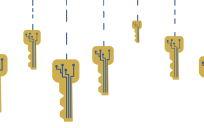We’ve heard a new term lately… it’s “breachapalooza”; a kind of tongue in cheek reference to the recent rash of security breaches in the news. Currently it’s OPM, but in the last two years it’s been Anthem, Target, and Home Depot, to name just a few. Understanding the fear and uncertainty that accompanies the announcement of these breaches compels us to offer some tips about services that offer identity protection, credit monitoring and credit recovery services.
First, you can’t always depend on the firm that was hacked to provide ID theft protection NOR can you ignore the problem. The bad guys ARE out to get your information; it’s a billion dollar problem! In the case of the OPM security breach, OPM plans to provide affected employees a complimentary subscription of CSID Protector Plus for 18 months, provided they actually enroll. Every affected employee, enrolled or not, will receive $1 million of identity theft insurance and access to full-service identity restoration services through CSID until 12/7/16. Affected federal employees will receive an email from OPM with a unique PIN number and access direction.
But what if you don’t get the offer from OPM because you were deemed non-affected? Or you aren’t a federal employee. Perhaps the constant barrage of security breaches in the news is prompting you to take precautionary steps to protect yourself from identity/credit fraud. Or, unfortunately, what if you’ve already been impacted by ID theft? If any of these scenarios is the case, you can use a credit monitoring service. Keep in mind that typically the most you can hope for with many credit monitoring plans is that they give you a heads up and then help you through the overwhelming process of getting the credit bureaus to fix your credit. We can’t tell you which plan will work best for your family but we can list a few of the monitoring plans you may want to check out various online credit monitoring services (i.e. lifelock, etc.).
For those of you who wish to go a step further, you may want to consider a little known process called the “Security Freeze”. Placing a security freeze on your credit file stops any potential creditors from being able to “pull” your file, unless you work with the credit agency to unfreeze your file beforehand. With a freeze on your credit file, ID thieves can still apply for credit in your name, but they will not succeed in getting new lines of credit because few, if any, creditors will extend that credit if they can’t see your credit file. Freezing your credit involves taking the time to notify each of the major credit bureaus that you wish to freeze your credit file. Sometimes this is an online process, while other times you need to call or write to the credit bureaus. Once the process is complete, you are given a Personal Identification Number or PIN that you will need when you contact the bureau again to “thaw” your credit file should you need to obtain credit in the future. Remember to save each PIN relative to each bureau. Please note that certain states or circumstances may dictate that you pay a fee to each bureau when you place the freeze, typically under $15 per bureau. The main credit bureaus are Equifax, Experian, Trans Union but you may want to contact others as well.
So how do I obtain credit when I need it? The easiest way to unfreeze your file for the purposes of gaining new credit is to proactively contact the firm from which you seek credit. Let them know you have a freeze on your credit file for safety reasons and find out which credit bureau they use for credit checks, likely one of the major bureaus. Once you know which credit bureau the creditor uses, contact that particular bureau and supply the PIN you received when you initially froze your credit file. Explain that you are applying for credit and need to “thaw” your file so it is accessible by the potential creditor. You may be given a choice to receive a “one time use” PIN for the purpose of your credit application or you may have to “thaw” your entire file for a period of time; each bureau is different. The “thawing” process typically does not take long, but you should ask the bureau for an estimate of their processing time. Keep in mind that many times, during a mortgage application for example, your credit may be checked at the beginning of the application and again right before closing. In this instance for example, if you elected to thaw your entire file, you should wait until you know the mortgage process is complete before you refreeze your credit file.
More Gary Fouts Articles
FEGLI –It sounds like a fancy pasta dish…Is it really good for me? by Gary Fouts
Understanding Your Social Security Benefits as a Federal Employee – by Gary Fouts
Are You Thinking About a “Deferred” Retirement? by Gary Fouts
Federal Employee Retirement Checklist by Gary Fouts
You Are a Federal Employee Millionaire — Let’s See Why! by Gary Fouts
A word of caution when using the “freeze” strategy: Each time you “refreeze” your credit file – fees may have to be paid again – so this strategy may be best for people who don’t have a constant need for new or immediate credit.
Please be aware that we have no affiliation with any of the providers mentioned and should you decide to pursue any of the services mentioned, or any others, you should do your own due diligence.
About the Author: Gary Fouts
Mr. Gary Fouts is currently the National Director of Retirement Benefits Training and a Senior Partner for Retirement Systems Solutions. He is responsible for all matters relating to both the development of RSS regional specialists across the nation and the creation of comprehensive and up-to-date training materials for federal, state and local employees or agencies. He specializes in federal, state and local benefits training and coordinates agency-sponsored and public seminars on how to structure retirement benefits. Prior to his current position, Mr. Gary Fouts served in the U.S. Navy, retiring after 22 years of faithful service as a US Navy Intelligence Officer. During that time he was directly responsible for supporting the warfare communities with valuable and timely intelligence. A trademark of his career in this capacity was the ability to inform his war fighting customers of what they needed to know to conduct their mission. He always distinguished between the facts that surrounded a situation and the emotion of the moment. This is a skill that translates directly into his line of work today as a benefits counselor. As our governments continue their never-ending expansion and contraction, now more than ever, it is crucial that all employees have an opportunity to receive clear, objective advice relative to their retirement benefits. Gary Fouts graduated in 1991 from Purdue University (Go Boilermakers!!!). He holds a Bachelors degree in Computer Information Systems and a Masters degree in Quality Systems Management. Mr. Fouts is a very active member of his local church and serves on the board of various charities. He is a devoted husband and father of five children and is married to Dr. Sara Lee Fouts.





I have had credit monitoring and look at my credit reports annually even before “breachapalooza” started. I just somehow knew it was the right thing to do. The ease with which companies and agencies can be breached now is very troubling.